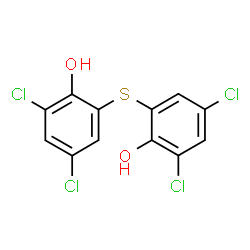
Bithionol added to soap solutions as an additive to function as an:
A. Buffering agent
B. Antiseptic
C. Softener
D. Dryer
Answer
609k+ views
Hint: Recall the properties of Bithionol and what its used for not just in soap solutions, but also the medical industry and in day-to-day life.
Step-by-Step Solution:
Bithionol is an aryl sulphide that is a diphenyl sulphide in which each phenyl group is substituted at position 2 by hydroxy and at positions 3 and 5 by chlorine.
A fungicide and anthelmintic, it was used in various topical drug products for the treatment of liver flukes, but withdrawn after being shown to be a potent photosensitizer with the potential to cause serious skin disorders.
It has a role as an anti platyhelminthes drug and an antifungal agrochemical. It is an aryl sulphide, an organochlorine pesticide, a dichlorobenzene, a polyphenol, a bridged diphenyl fungicide and a bridged diphenyl antifungal drug.

Bithionol is generally added to the soaps as an additive to function as an antiseptic as it helps to reduce the odour produced by bacterial decomposition of organic matter on the skin.
Therefore by our analysis, the answer to this question is b) Antiseptic.
Note:
There is no way to intuitively know the answer to this question and the answer to this can only be known if the student is completely familiar with the action of bithionol in soap.
Additional Information:
Bithionol, formerly marketed as an active ingredient in various topical drug products, was shown to be a potent photosensitizer with the potential to cause serious skin disorders.
Bithionol is bis-dichlorophenol, and it is structurally similar to hexachlorophene.
It is the anthelmintic drug of choice for treating humans infected with Fasciola hepatica. It is also an alternative drug to praziquantel that is used for treating pulmonary and cerebral paragonimiasis.
Step-by-Step Solution:
Bithionol is an aryl sulphide that is a diphenyl sulphide in which each phenyl group is substituted at position 2 by hydroxy and at positions 3 and 5 by chlorine.
A fungicide and anthelmintic, it was used in various topical drug products for the treatment of liver flukes, but withdrawn after being shown to be a potent photosensitizer with the potential to cause serious skin disorders.
It has a role as an anti platyhelminthes drug and an antifungal agrochemical. It is an aryl sulphide, an organochlorine pesticide, a dichlorobenzene, a polyphenol, a bridged diphenyl fungicide and a bridged diphenyl antifungal drug.

Bithionol is generally added to the soaps as an additive to function as an antiseptic as it helps to reduce the odour produced by bacterial decomposition of organic matter on the skin.
Therefore by our analysis, the answer to this question is b) Antiseptic.
Note:
There is no way to intuitively know the answer to this question and the answer to this can only be known if the student is completely familiar with the action of bithionol in soap.
Additional Information:
Bithionol, formerly marketed as an active ingredient in various topical drug products, was shown to be a potent photosensitizer with the potential to cause serious skin disorders.
Bithionol is bis-dichlorophenol, and it is structurally similar to hexachlorophene.
It is the anthelmintic drug of choice for treating humans infected with Fasciola hepatica. It is also an alternative drug to praziquantel that is used for treating pulmonary and cerebral paragonimiasis.
Recently Updated Pages
Master Class 12 Economics: Engaging Questions & Answers for Success

Master Class 12 Physics: Engaging Questions & Answers for Success

Master Class 12 English: Engaging Questions & Answers for Success

Master Class 12 Social Science: Engaging Questions & Answers for Success

Master Class 12 Maths: Engaging Questions & Answers for Success

Master Class 12 Business Studies: Engaging Questions & Answers for Success

Trending doubts
Which are the Top 10 Largest Countries of the World?

What are the major means of transport Explain each class 12 social science CBSE

Draw a labelled sketch of the human eye class 12 physics CBSE

Why cannot DNA pass through cell membranes class 12 biology CBSE

Differentiate between insitu conservation and exsitu class 12 biology CBSE

Draw a neat and well labeled diagram of TS of ovary class 12 biology CBSE




